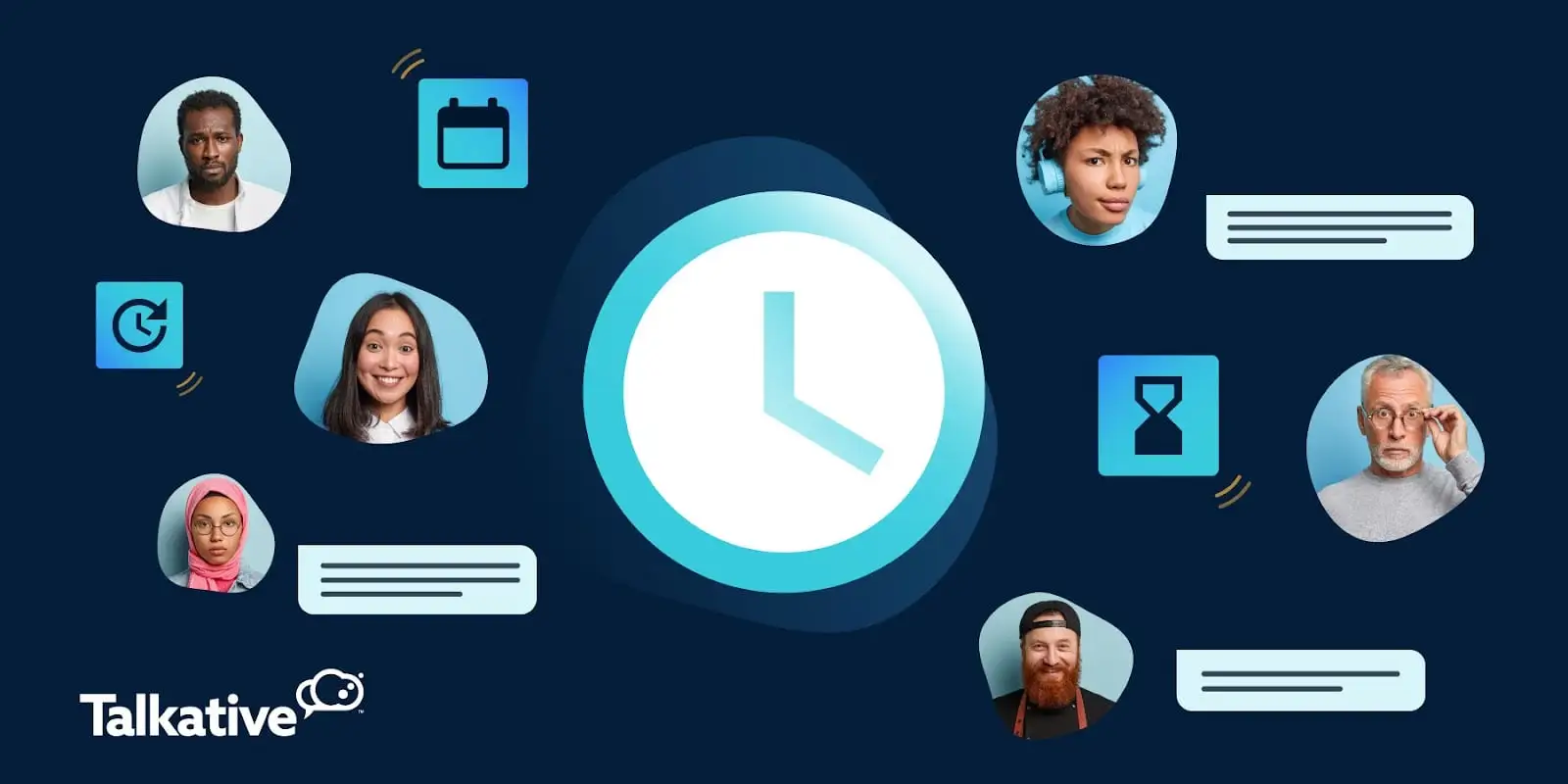In a successful contact center, agent productivity is a crucial factor.
This is because it has a direct impact on efficiency, performance, and the customer experience.
In fact, improving agent productivity and engagement can increase customer satisfaction (CSAT) scores by 62% and boost efficiency by 56%.
It can also improve metrics like wait tines, average handling time, and first call resolution rates.
But as customer expectations continue to rise, the demands on call centres are higher than ever.
From juggling multiple channels to dealing with irate customers and keeping up with new technologies, excelling as an agent can be challenging.
Fortunately, whether you’re an agent striving to self-improve or a supervisor/manager looking to empower your support team, the right strategies can make all the difference.
So, how can agents and supervisors work together to achieve optimal productivity and success?
That’s exactly what this guide is here to answer. We’ll cover:
- How to measure agent productivity with key performance metrics
- How to help agents improve their productivity as a manager or supervisor
- How to excel & enhance individual productivity and performance as a call centre agent

How to measure agent productivity: Key performance metrics
Agent productivity is how effectively and efficiently call centre agents handle interactions, resolve issues, and meet key performance indicators (KPIs).
To improve agent productivity, you first need to measure it using contact center agent performance metrics.
These metrics not only provide a snapshot of current productivity and performance but also help identify areas where agents can improve.
The following are some key agent performance metrics every call centre should monitor:
- First Contact Resolution Rate (FCR) / First Call Resolution Rate: Measures the percentage of issues resolved during the first interaction, reflecting an agent’s ability to quickly and effectively address customer concerns.
- Customer Satisfaction Score (CSAT): Gauges how satisfied customers are with their interaction, offering direct insight into the customer experience and wait times.
- Average Handling Time (AHT): Tracks the average time agents spend resolving customer issues. Lower AHT often reflects efficiency but should not come at the cost of quality.
- Net Promoter Score (NPS): Tracks customer loyalty by measuring the likelihood of a customer recommending your service to others, which indirectly reflects agent effectiveness.
- Abandonment Rate: Reveals the percentage of interactions ended by a customers before their issues are addressed, indicating customer frustration or poor customer service.
- Average Response Time: Measures how long it takes for an agent to respond to a customer inquiry. Faster response times can improve customer satisfaction (CSAT) and loyalty.
- Total Number of Interactions: Tracks how many customer interactions or customer calls an agent handles within a specific timeframe, showcasing productivity and efficiency.
- Schedule Adherence: Indicates how closely agents follow their assigned work schedules, measuring agent productivity, agent efficiency, and task management skills.
Using metrics to monitor and measure agent productivity ensures that supervisors and agents alike remain focused on enhancing productivity and delivering high-quality, efficient service.
These metrics also provide a foundation for setting clear goals, tracking progress, and implementing targeted strategies to enhance both the customer experience and operational outcomes.

How to improve agent productivity as a manager or supervisor
Contact center team leaders play a huge role in helping and empowering agents to perform optimally.
In this section, we’ll explore 5 strategies that supervisors or managers can use to enhance their call centre agents' productivity.
1. Identify root causes of low productivity
Understanding why your agents are underperforming is the first step toward addressing the issue.
Poor agent productivity often stems from a variety of factors, and identifying these root causes ensures that solutions are effective and targeted.
Some common reasons for underperformance in call centres include:
- Insufficient Training: Lack of comprehensive onboarding or ongoing training and support leads to gaps in product knowledge and communication skills.
- Workload Issues: Excessive interaction volumes, unrealistic performance expectations, and monotonous or repetitive tasks can decrease agent productivity and morale.
- Lack of Resources: Agents struggle to perform optimally when they lack the necessary resources to resolve customer issues independently. Worryingly, 86% of agents feel that they don’t have the resources or decision-making authority to deal with customers effectively.
- Inadequate Tools & Technology: Outdated or inefficient customer service software, slow systems, and lack of integrated tools will hinder agent productivity and agent efficiency.
- Access to Information: Limited access to up-to-date information and knowledge bases can hamper agents’ ability to provide accurate and timely solutions. In fact, 60% of failed attempts at First Contact Resolution (FCR) are due to an agent’s inability to access the right data.
- Negative Work Environment: Workplace toxicity and a lack of incentives/recognition or opportunities for career development can adversely impact both job satisfaction and agent productivity.
- Emotional Labour: Managing customer emotions and maintaining a positive demeanour during challenging interactions or customer calls is draining, leading to a decline in productivity and performance. This is significant as 81% of agents report dealing with verbal or emotional abuse from customers on a daily basis.
To pinpoint the issues specific to your organisation, consider gathering insights from agent performance reports, customer feedback, and one-on-one agent check-ins.
Once the root causes are clear, you can implement tailored strategies to support struggling agents and create a more positive work environment.

2. Provide targeted training
A well-trained agent is an empowered agent.
That said, generic training sessions might not always address the specific challenges your team faces, so targeted training programs are essential.
These programs should focus on the skills and knowledge gaps identified through analysing performance metrics and direct feedback.
For example, if your support agents struggle most with technical or troubleshooting queries, provide specialised product training.
If handling difficult customer conversations is a key challenge, invest in conflict resolution courses or workshops.
A great way to provide targeted training is through simulations of specific customer service scenarios and interactions.
One way you can do this is with Talkative’s AI-powered Agent Training feature.
This tool allows call centre agents to practise and refine their skills through automated simulations of customer interactions.
Once set up, the AI simulator can act and converse as a human customer would in any specified scenario you choose.
Your support agents will then be able to interact with it as they would with a customer during a live chat session, allowing them to practise real-world situations in a risk-free environment.
This not only helps existing agents to upskill and improve productivity but can also be utilised when training or onboarding new staff.
Ongoing learning opportunities like this both enhance agent productivity and boost engagement and morale.
By showing your commitment to agent growth, you’ll also foster a culture of continuous improvement and excellence within the customer service department.

3. Set clear expectations & key performance indicators (KPIs)
Agents perform best when they have a clear understanding of what is expected of them.
Defining measurable goals and communicating them effectively is vital for improving productivity.
Key performance indicators (KPIs) for customer satisfaction scores, first contact resolution / first call resolution rates, average handling times, wait times, etc., should be transparent and achievable.
When setting targets or expectations, ensure they align with both the company’s objectives and individual agent capabilities.
It’s important not to set unrealistic or extreme targets that feel out-of-reach to agents, as this may cause too much pressure and hinder productivity rather than improve it.
The aim is to motivate and encourage your support agents - not pile on the pressure.
Breaking down goals down into smaller milestones can help with this by making them more manageable. It'll also allow agents to regularly celebrate small wins as they progress.
You should also avoid punishing or harshly criticising agents who fall short of their goals.
Instead, sit down with them to find out why they’re not hitting their targets. If there are issues holding them back, you can work together to support them and come up with solutions.
When agents feel empowered and know exactly what success looks like, they can focus their efforts on meeting, or even exceeding, those expectations.

4. Offer constructive feedback & reward achievements
Constructive feedback is one of the most powerful tools a supervisor can use to improve agent productivity .
When delivered effectively, it guides support agents toward better results without demotivating them.
You should endeavour to frame feedback positively by focusing on specific behaviours rather than personal attributes and always pair criticism with actionable suggestions.
For example, instead of saying, "Your customer interactions are slow," you could say, "I noticed that customer calls are taking longer than average - let’s help you streamline your process for gathering customer information."
It’s important that agents are given feedback consistently. Try to arrange regular one-to-one sessions that incorporate performance feedback and coaching.
Equally important to offering feedback is recognising and rewarding great or improved productivity.
Acknowledging accomplishments and strengths reinforces positive behaviours and boosts agent morale, as well ac creating a more positive work environment.
Celebrate successes like high customer satisfaction scores or consistent schedule adherence with incentives such as bonuses, public recognition, employee-of-the-month schemes, custom awards, or vouchers.

5. Take steps to reduce agent burnout
Employee burnout is a major problem in the contact center industry and a significant contributor to declining agent productivity.
In fact, more than half (59%) of call centre agents are at risk of burnout, and 87% report high or very high levels of workplace stress.
As a manager or supervisor, taking proactive steps to reduce stress, cultivate a positive work environment, and promote work-life balance is crucial.
The following practices can help prevent or reduce agent burnout:
- Recognise Signs of Burnout: Stay vigilant for early indicators of burnout, such as decreased productivity, frequent absenteeism, and irritability, so you can intervene early.
- Manage Workloads Effectively: Avoid overburdening agents by ensuring balanced workloads. Implement smart workload distribution, flexible scheduling, regular breaks, and considerate shift planning.
- Empower Agents with Decision-Making Authority: Giving support agents the autonomy to make decisions within certain guidelines can boost their confidence and reduce the stress associated with rigid scripts or micromanagement.
- Implement Work Flexibility: Offer flexible scheduling options, remote work opportunities, or adjustable shift patterns to accommodate personal needs and promote a healthy work-life balance.
- Optimise Contact Center Efficiency: Improve operational efficiency with tools like AI and automation, diversified support channels, and self-service options. This makes the role of an agent easier and decreases stress.
- Promote Open Communication: Encourage agents to voice their concerns or challenges without fear of judgment. Create an open-door policy and anonymous feedback opportunities if needed.
- Offer Staff Well-Being Resources: Provide access to mental health resources such as counselling, stress management programs, or wellness initiatives.
By taking steps to prevent burnout, managers and supervisors can enhance agent well-being and overall contact center performance, as well as significantly improve employee retention.

How to excel & self-improve as a call centre agent
Although the role of a supervisor or manager is important, call centre agents also need to take responsibility for their own productivity, performance, and self-development.
Below, we’ll provide 5 strategies that support agents can apply to perform better and reach their full potential.
1. Make friends with AI tools & technology
Contact center AI technologies are often viewed with scepticism by agents who worry about new technology and automation replacing their roles.
But the reality is quite the opposite - AI isn’t here to take over; it’s here to help.
By embracing AI tools, agents can unlock a new level of productivity, efficiency, and service quality.
In fact, AI can boost employee performance by 66%, and 60% of call centre agents report that AI helps them save time.
This is because AI-powered solutions are actually assistive tools for agents, not replacements.
For instance, AI chatbots and virtual agents work alongside agents to handle a wide range of queries and routine tasks without human intervention.
They also provide instant self-service options to customers.
This frees you up to focus on complex cases or high-value tasks that truly need a human touch.
But where AI really shines in enhancing agent productivity is when it’s used to provide agents with real-time assistance and guidance during live interactions.
For example, Talkative’s AI Agent Copilot suite uses your company knowledge bases and generative AI to produce highly accurate and on-brand response suggestions to customer queries.
In addition to response suggestions, Agent Copilot also provides 'Navi', an internal-facing chatbot that acts as your personal AI assistant.
Navi can answer agent questions using the current interaction context and company knowledge base content, eliminating the need to search for information manually.
It can also recommend the next actions to take and summarise the web page that the customer is viewing (if they’re currently on your company website).
When you make AI your ally, you’ll not only improve your own performance and productivity but also enhance the overall customer experience.
Embracing these technologies allows you to work smarter, not harder, empowering you to shine in your role as an agent while meeting rising customer expectations with confidence.

2. Become an expert in company knowledge
Knowledge is power, especially in a customer service role.
As a call centre agent, your ability to provide accurate and timely information about your company’s products, services, and policies is crucial for optimal agent performance during interactions.
It also plays a key role in helping you build customer trust and satisfaction.
With this in mind, ensure you take advantage of training sessions, knowledge bases, and internal resources to deepen your understanding of your company’s offerings.
Regularly review updates or new features to ensure you’re always equipped to handle customer questions confidently.
During downtime, explore FAQs or collaborate with colleagues to fill any gaps in your knowledge.
Being well-informed doesn’t just improve first call resolution rates - it will also boost your confidence and make interactions smoother for both you and the customer.

3. Improve time management
Time management is a critical skill for call centre agents.
From handling high call volumes to switching between tasks, staying organised and efficient is essential for maintaining productivity.
To do this, start by analysing your daily routine and identifying areas where time is often lost.
For instance, do you often find yourself interrupted by unexpected tasks throughout the day? If so, set aside buffer periods to handle unforeseen issues without derailing your schedule.
Consider using tools like to-do lists or task management apps to stay on track with your schedule and reduce the risk of falling behind.
Additionally, try to prioritise tasks that have the biggest impact on your KPIs and the customer experience, such as resolving customer concerns promptly or following up on unresolved issues.
Ultimately, effective time management not only improves your productivity and performance but also enhances the overall quality of customer service interactions.

4. Prioritise self-development
If you want to excel in your role, committing to continuous learning and self-improvement is essential.
The most successful agents are those who actively seek opportunities to grow their skills and expand their knowledge.
In addition to attending the training and coaching provided by your company, you can use the following practices to self-develop and improve in your role:
- Take Online Courses: Enroll in courses on customer service skills, communication, or industry-specific knowledge. Platforms like Coursera, Udemy, or LinkedIn Learning offer a range of options and your employer may be willing to front the cost for paid courses.
- Seek Regular Feedback: Proactively ask supervisors and managers for constructive feedback and use it to identify areas for improvement.
- Stay Updated on Industry Trends: Utilise blogs, podcasts, or webinars focused on customer service or your specific industry to broaden your knowledge and skill set.
- Shadow High-Performing Colleagues: Observe top-performing agents to gain insights into effective techniques and strategies for customer interactions.
- Read Books on Personal Development: Explore books or articles on topics such as time management, conflict resolution, or stress management to enhance your professional growth.
- Utilise Internal Resources: Take advantage of your company’s training tools or materials, knowledge bases, and performance dashboards to refine your skills.
- Track Personal Progress: Set self-development goals (see below) and regularly measure your progress against them to maintain focus and motivation.
Self-development isn’t just about career growth - it’s about becoming more effective and fulfilled in your role.
By investing in yourself, you’ll not only improve agent productivity but also enhance your ability to meet customer needs with confidence and professionalism.

5. Set personal goals
Setting personal performance goals is a great way to stay motivated and measure your progress.
Start by identifying specific areas where you want to improve productivity, such as reducing average call duration, increasing customer satisfaction scores, or enhancing your script adherence rate.
Then, break these larger objectives into smaller, actionable steps.
For example, if you want to improve your first call resolution rate, focus on sharpening your problem-solving skills and studying your company’s complex policies or product/service details.
Track your achievements regularly to stay motivated, and celebrate milestones to maintain momentum.
If it works for you, you can also set bigger, overarching goals for your future career development and plans.
Having clear goals not only helps you measure your individual agent productivity but also aligns your efforts with overall business growth and success.

The takeaway
Improving agent productivity is no small task, but it’s one that yields immense rewards for contact centers, agents, and customers alike.
By utilising the key strategies outlined in this guide, both supervisors and agents can contribute to a more efficient, productive, and customer-focused environment.
As the demands on call centres continue to grow in 2025 and beyond, those who prioritise these strategies will be well-positioned to sustain customer satisfaction and drive business success.
But, if you want to get the best results from these tactics, you also need to equip your agents with the best technology to help them in their roles.
That’s where Talkative comes in.
Our solution comes with a range of tools designed to help and empower your customer service team, including:
- AI solutions (e.g. Agent Copilot, AI knowledge bases) that empower agents to perform better and faster during live customer interactions
- Automated training with an AI-powered interaction simulator that helps agents improve their skills and confidence by practising specific scenarios.
- GenAI chatbots that reduce agent workloads by automating customer support, self-service, and other routine tasks.
- Real-time translation technology to assist agents who serve a diverse customer base.
- Live support for agents from supervisors/managers via real-time monitoring and internal messaging.
We also provide a suite of digital customer support channels - including live chat, web calling, video chat, cobrowse, and social messaging.
You can even pick and choose the channels, capabilities, and integrations you need - allowing you to tailor our solution to your specific business needs.
Want to learn more?
Book a demo with Talkative today, and check out our interactive product tour.



